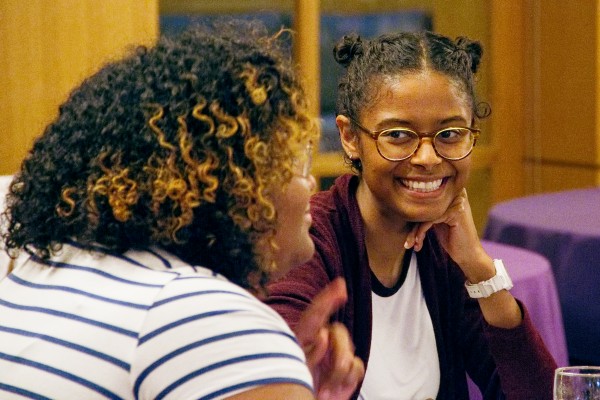Vulnerability and Bravery: KEEP’s 10th Anniversary

On Saturday night, I almost cried. I was sitting with a group of KEEPers, celebrating the 10th anniversary of the program. Holding my silverware and sipping from a fancy glass, I listened as KEEPers from years past and years present related their stories about the impact of KEEP. Their stories — painful, bittersweet, triumphant and legendary — made me feel the warmth that comes with being part of something so influential as this program.
The Kenyon Educational Enrichment Program (KEEP) brings underrepresented students to Gambier early, before their first year at Kenyon, to take classes, make friends and connections, but — perhaps most importantly — to find their place on campus. The program started in 2007 with 12 students, then grew to 24 students in 2012, and then to 36 this past summer. Its growth reflects its necessity at Kenyon.
College is a scary place. There is no doubting that. And for students from underrepresented backgrounds facing the largely white and traditionally privileged culture of Kenyon and of higher education at large, the extra support that KEEP provides is pivotal. To be clear, KEEP is not a remedial program. It is a program that awakens leadership, academic talent and ability in its students. And when all the odds seem to be against us, KEEP scholars have the faculty we grew close with over the summer, our KEEP cohort and former KEEP students to believe in us.
My journey to Kenyon started with KEEP. Before I enrolled in my first semester of college courses, before New Student Sing, before Convening Dinner, I was a freshly-out-of-high-school student embarking on a new summer adventure. Kenyon in the summer, marked by fresh green leaves and warm sunlight, held the opportunity to start to think of myself as a college student, of all the hard work that it would take to succeed.
We sometimes don’t realize just how vulnerable we are until we are braver, until we have grown from that moment of vulnerability. I knew entering Kenyon would be a challenge based on its academic rigor alone, and more so as a woman of color because the majority of the student and faculty population did not reflect me or the communities I grew up in. As the years at Kenyon went on, I found the faculty and students who recognized my potential. KEEP gave me those role models the moment I stepped on campus. I knew I needed to be in KEEP because I felt socially unprepared for Kenyon, but it has taken me until now — as a senior — to realize that KEEP also served to guide and lead me as a vulnerable student at Kenyon.
I want to emphasize that vulnerability is not a synonym for weakness or lack of skills or intellect, but simply an acknowledgement of the barriers we each face as individuals confronting a diverse, pluralistic and conflicting world.
When I tell prospective students about Kenyon, I always mention KEEP. I talk about my best friends from KEEP, my faculty mentors, my educational and social growth, my sense of personhood — all the wonderful things that I built through the program. I sometimes think that KEEP is the sole reason that I could be at Kenyon at all. This may be a little bit sad, but I think it's important to ask the tough questions: How do we perceive our Kenyon community when people like me feel out of place? What actions do we take to fix that (KEEP is a solution, but not the only one)? How do we reach our students, faculty and staff to emphasize the importance and acceptance of diversity in all forms? How do we develop KEEP to make it be the best program it can be?
I look back at KEEP with fondness and gratitude. But, most importantly, I look at myself now. I see the simple things KEEP taught me: time management, how to handle a college course, how to balance a social life. And then I see how these things have propelled me along on my own twisty-turny life journey. Surely, KEEP will continue to teach me lessons as I leave campus. And all I hope is that other students can experience KEEP, too, to have those lessons as well.
I'm going home choked up after the incredibly moving and powerful #KEEP reunion. So proud of our @KenyonCollege #KEEP students and alumni. pic.twitter.com/atpCW3phig
— Sean Decatur (@sean_decatur) September 17, 2017
